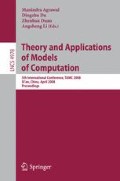Abstract
This paper investigates symbolic algorithm analysis of rectangular hybrid systems. To deal with the symbolic reachability problem, a restricted constraint system called hybrid zone is formalized. Hybrid zones are also applied to a symbolic model-checking algorithm for verifying some important classes of timed computation tree logic formulas. To present hybrid zones, a data structure called difference constraint matrix is defined. Using this structure, all reachability operations and model checking algorithms for rectangular hybrid systems are implemented. These enable us to deal with the symbolic algorithm analysis of rectangular hybrid systems in an efficient way.
This research is supported by the NSFC under Grant No. 60373103 and 60433010, the SRFDP under Grant 20030701015.
Access this chapter
Tax calculation will be finalised at checkout
Purchases are for personal use only
Preview
Unable to display preview. Download preview PDF.
References
Alur, R., Courcoubetis, C., Halbwachs, N., Henzinger, T.A., Ho, P.-H., Nicollin, X., Olivero, A., Sifakis, J., Yovine, S.: The algorithmic analysis of hybrid systems. Theoretical Computer Science 138, 3–34 (1995)
Alur, R., Courcoubetis, C., Henzinger, T.A., Ho, P.-H.: Hybrid Automata: an Algorithmic Approach to the Specification and Verification of Hybrid Systems. In: Grossman, R.L., Ravn, A.P., Rischel, H., Nerode, A. (eds.) HS 1991 and HS 1992. LNCS, vol. 736, Springer, Heidelberg (1993)
Alur, R., Henzinger, T.A., Ho, P.-H.: Automatic Symbolic Verification of Embedded Systems. In: Proceedings of 1993 IEEE Real-Time System Symposium (1993)
Annichini, A., Asarin, E., Bouajjani, A.: Symbolic Techniques for Parametric Reasoning about Counter and Clock Systems. In: Emerson, E.A., Sistla, A.P. (eds.) CAV 2000. LNCS, vol. 1855, Springer, Heidelberg (2000)
Dill, D.L.: Timing Assumptions and Verification of Finite-State Concurrent Systems. LNCS, vol. 407, pp. 197–212 (1989)
Duan, Z.: Modeling of hybrid systems. Ph.D thesis, Department of Computer Science, University of Shefield, UK (February 1997)
Henzinger, T.A., Kopke, P.W., Puri, A., Varaiya, P.: What′s decidable about hybrid automata? J.Comput.Syst.Sci. 57, 94–124 (1998)
Henzinger, T.A., Majumdar, R.: Symbolic model checking for rectangular hybrid systems(Abstract). In: Schwartzbach, M.I., Graf, S. (eds.) ETAPS 2000 and TACAS 2000. LNCS, vol. 1785, pp. 146–156. Springer, Heidelberg (2000)
Kopke, P.W.: The thoery of Rectangular Hybrid Automata. Ph.D thesis, Cornell University (1996)
Wang, F.: Symbolic Parametric Safety Analysis of Linear Hybrid Systems with BDD-Like Data-Structures. In: Alur, R., Peled, D.A. (eds.) CAV 2004. LNCS, vol. 3114, pp. 295–307. Springer, Heidelberg (2004)
Behrmann, G., Larsen, K.G., Pearson, J., Weise, C., Yi, W.: Efficient Timed Reachability Analysis Using Clock Diffierence Diagrams. In: Halbwachs, N., Peled, D.A. (eds.) CAV 1999. LNCS, vol. 1633, pp. 341–353. Springer, Heidelberg (1999)
Karmarkar, N.: A new polynomial-time algorithm for linear programming. Combinatorica 4(4), 373–395 (1984)
Zhang, H., Duan, Z.: Symbolic Reachability Analysis of Rectangular Hybrid Systems. In: ICCP 2006, Cluj-Napoca, Romania, pp. 240–248 (2006)
Alur, R., Courcoubetis, C., Dill, D.L.: Model-checking in dense real-time. Inform. Computat. 104, 2–34 (1993)
Anai, H., Weispfnening, V.: Reach Set Computations Using Real Quantifier Elimination. In: Di Benedetto, M.D., Sangiovanni-Vincentelli, A.L. (eds.) HSCC 2001. LNCS, vol. 2034, pp. 63–76. Springer, Heidelberg (2001)
Zhang, H., Duan, Z.: Symbolic Reachability Analysis of Multirate Hybrid Systems. Journal of Xi’an Jiao Tong University 41(4), 412–416 (2007)
Zhang, H., Duan, Z.: Decidability of The Dense Timed Interval Temporal Logic. Journal of Xidian University 34(3), 463–467 (2007)
Author information
Authors and Affiliations
Editor information
Rights and permissions
Copyright information
© 2008 Springer-Verlag Berlin Heidelberg
About this paper
Cite this paper
Zhang, H., Duan, Z. (2008). Symbolic Algorithm Analysis of Rectangular Hybrid Systems. In: Agrawal, M., Du, D., Duan, Z., Li, A. (eds) Theory and Applications of Models of Computation. TAMC 2008. Lecture Notes in Computer Science, vol 4978. Springer, Berlin, Heidelberg. https://doi.org/10.1007/978-3-540-79228-4_26
Download citation
DOI: https://doi.org/10.1007/978-3-540-79228-4_26
Publisher Name: Springer, Berlin, Heidelberg
Print ISBN: 978-3-540-79227-7
Online ISBN: 978-3-540-79228-4
eBook Packages: Computer ScienceComputer Science (R0)

